The Upside of Breaking Things
Sometimes you don’t know what you need until you’ve broken what you have
Wait a two seconds there, friend. If you’ve been enjoying TLG, I’ve two quick asks:
Hit the heart and like this ❤️ —it helps people find me, makes my heart go pitter pat and helps build a community of caregivers
Share this with one person you think’d like it. Or to your socials, because again, this is all about building community to support each other.
She’d been living in a cotton ball, again.
I thought we’d handled it years ago when I pushed her to get hearing aids. She’d put them in, one at at time, and test ‘em “La, la, la, LA!”
Years passed, no more La las.
There were repeated painful infections in one ear and as the dementia progressed, it got harder to get to the doctor. Almost deaf in that ear anyway, she managed pretty well with just one hearing aid.
Until, she cracked it in half.
In her defense, it was a ten-year-old piece of plastic.
Way past even the extended warranty, Is there any point in replacing it, I wondered.
She hasn’t paid attention to her surroundings in a while. Stopped caring about music she used to sing along with. Spent more time with the invisible friends, ignoring the fleshy ones in the room. Spending most of the day with eyes closed; life happened on the inside of her eyelids. Happy to sleep through meals, there hasn’t been a really coherent interaction in weeks. Maybe months.
Would it really make a difference?
The audiologist isn’t convenient now that a) Mom doesn’t live on Long Island and b) I don’t have a car. And they wanted her to have a new hearing test.
Renting a car, getting Mom up, showered, dressed & fed, into the wheelchair, into the rental car, buckled in, out to Long Island, out of the car, up to the doctors office at the appointed time?
Once you throw “appointed time” in there what you have is an impossibility. We’d hit impossible at “getting Mom up” at whatever hour necessary to make everything else fall into place. Mom gets up when Mom gets up.
Even if we got her there on time, and awake, getting her into the soundproof booth as the doctors instruct her to raise a hand when she hears a tone, or to repeat words? Those days are long gone, baby. Long gone.
They agreed to give us a hearing aid, using her ten-year-old test as a baseline. Wednesday morning we got something with more oomph—$1700 and a $100 car rental later, Ma had a turbo-charged hearing aid.
By the following Monday, Ma’d rolled, if not the disease, at least her behavior back, a year? Two?
It was, The Return of Ma.
It could be a coincidence. I don’t think so.
It might not last. I don’t care.
We’ve returned to complete, situationally appropriate sentences and responses.
Rediscovered playful, silly and mischievous.
I had the Ma I knew and missed.
What’s that?
- Your clothes for today.
What? The brown? That’s mine?
Identifying a color!
She has teddy bears - pink, green, white, panda. None of those colors meant anything, at any time.
Suddenly, “Purple is my favorite color.”
“You’re not allowed to do that,” at the attempt to take her blood pressure, which annoys her.
“You said I don’t have to do anything I don’t want to,” as we try to get her into the shower. She’s right. We say that all the time. She hasn’t said it back in ages.
She’s playing her version of volley-dodge ball again, where she’s the mean girl with the power arm and you’re the skinny nerd.
Skimming clothing catalogs, tearing out pages, using them as blankets for the smaller stuffed animals. That behavior had disappeared a year ago.
An aide who annoyed got a time out: “Get out of here, put your head on the head,” pointing to the pillow on the bed, which makes perfect sense because where does your head go at night? On the head place aka the pillow. That was early stage language skills. Tonight, I will put my head on the head.
I moved in for a kiss, she leaned towards me, then pulled away last minute and laughed. We tried again, she bit my nose and giggled.
She stuck her tongue out at us more than once in this week. A go-to move, we hadn’t seen her go to in…a year?
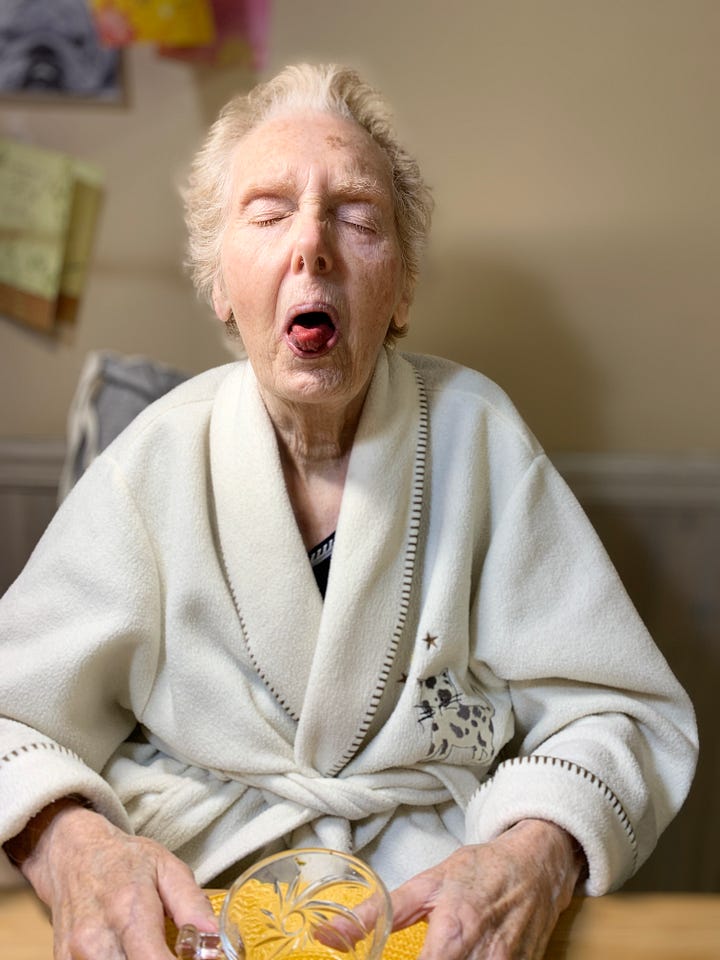
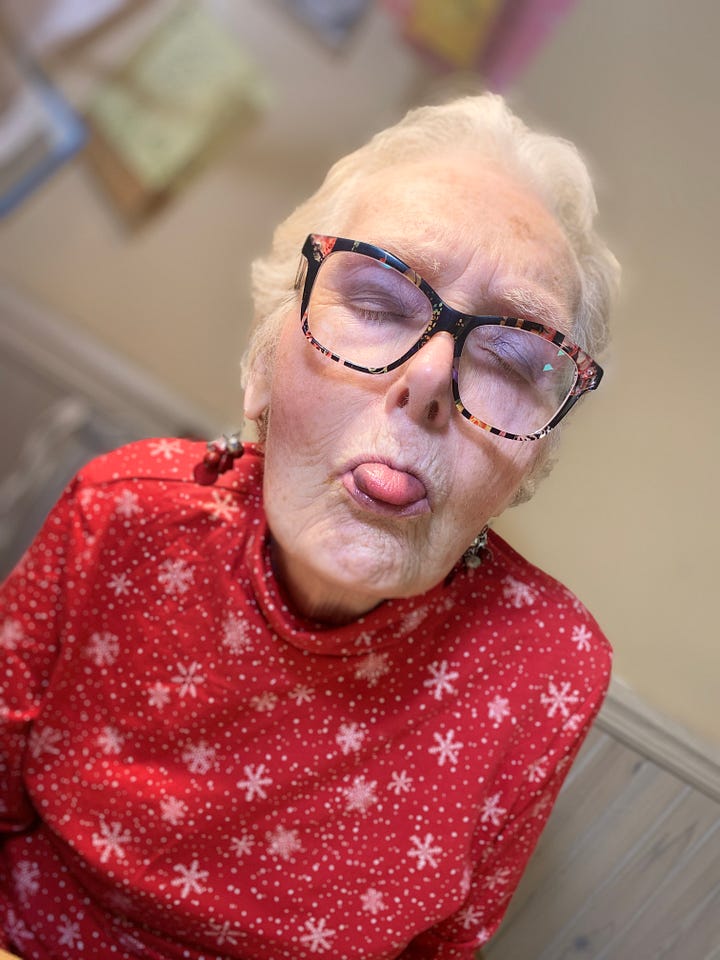
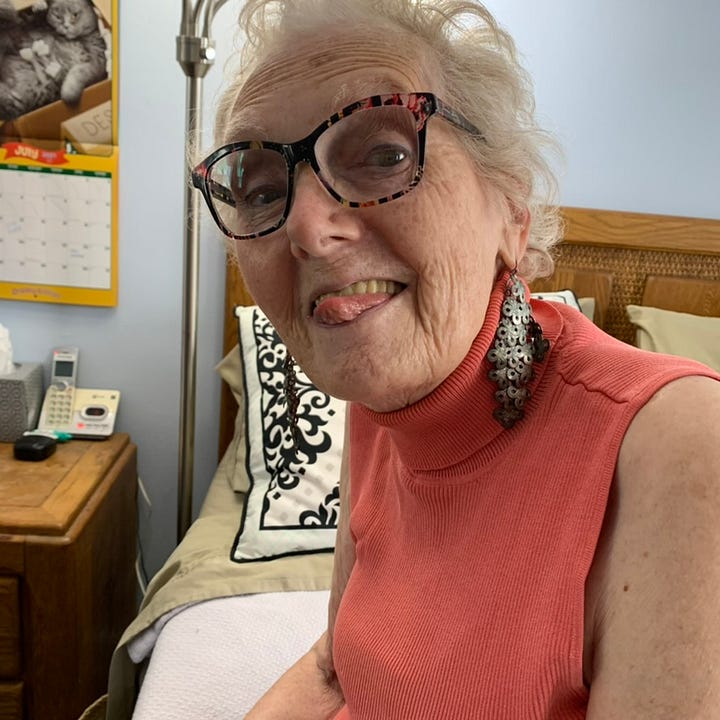

Is sense of taste connected to hearing?
Pedialyte and Boost are delicious, soft, easy, good, and nice again, they’d been…nothing. She had been eating and drinking by obedience, not desire. She’s enjoying them again, asking for more, taking the cup in her hand again.
Yes.
That’s the short answer. Who knew? The explanation and the mechanism behind it can be found here.
Hearing Loss and Dementia
There’s no shortage of research and studies that hearing loss directly impacts the onset and progression of dementia. It can lead to social isolation, reduced stimulation; you begin to be comfortable living in a world wrapped in cotton, letting conversations slip by, nodding and smiling rather than asking someone to repeat themselves. You disengage, incrementally. The disengagement was the main reason I pushed her to get tested ten years ago, rather than continue turning television volume up until she made the windows rattle.1
Am I saying getting some hearing back has “cured” her or slowed things down? No. I’m not a doctor, but I’m also not an pie-eyed idiot.2
I’d assumed her hearing had faded away.
It hadn’t occurred to me that she was working with a hearing aid that was ten years old, may not’ve been working well, set to compensate for her hearing loss at 85, living on her own, fooling around with her geriatric boyfriend. Before assisted living, a broken back, pneumonia, Covid, the quarantine. A lot had happened and without me realizing it, her ears aged along with the rest of her.
She didn’t have the words or neural connections to say her hearing had gotten worse. She may not even have noticed.
Now?
“I can’t hear you,” when her hearing aid is out (doesn’t stop her from pulling it out).
She’s Ma 2.0
She’s engaged with a world she can hear. She’s in the kitchen, bopping along to Shaggy and TuPac on Alexa, eyes open, playing ball with her aide.
She’s singing, laughing, playing, enjoying food and conversation again.
Dementia’s Cognition Surge
I worried, was it the surge, aka Terminal Lucidity, a sudden burst of clarity and lucidity shortly before death.
Per the Cleveland Clinic, “one experiencing terminal lucidity may:
React to loved ones after being withdrawn and disengaged before
Speak coherently after previously being unable to communicate
Express wants and needs, like asking for a glass of water or a favorite food
Recognize people they’d forgotten, like old friends from a photograph
Recollect past experiences and eagerly recount these memories to others
Participate in a favorite activity, like singing or playing a musical instrument they haven’t touched in years
It may feel as if your loved one has returned to their ‘old self.’”
They don’t know the what, why or how of Terminal Lucidity (an awful name, but better than Pre-Mortem Surge!).
It can last a few minutes or hours to a few days.
It’s been a week and half.
This ain’t that.
Mom’s medical professionals haven’t been able to explain how she’s coherent and linear with the invisible friends and spoke gibberish with us, either.
Was she was hearing them clearly & responding in kind?
Was she unable to hear us well & responding in kind to us as well?
Here’s what I’ve learned about dementia.
There’s no “they all” or prescribed route the disease will take.
Angry, speechless, naked, wandering, silly, irritable, withdrawn, loud, quiet, paranoid, trustful.
Here’s what I’ve learned about caregiving.
Meet them where they are, not where you want them to be.
Change is a constant, or it’s not.
Things will continue to degrade, or not.
Stay in the moment.
This was one of the first times I’d felt tears well up behind my eyes. Friends familiar with the journey of the last seven years ask tentatively, “Is this a good thing?”
They’re really asking, will she live longer?
How’s mom? I’d hated that question. For now, I look forward to it.
This week, I signed the paperwork for a trust that will care for mom in case I go first.
Will engaging with the world make her live longer?
idk ::shrugs::
She’ll enjoy herself more, for sure.
My job is to keep her safe, free from pain and fear and if I can throw some joy in there, that’s gravy.
I got my Ma some of her gravy back.
If this post touched your heart, please restack, comment, and like. It helps readers find me, helps build the community of caregivers.
How else can you support my writing? Becoming a paid subscriber. Gift a give subscription.
Or, drop a buck or two into the coffee fund.
Two Ways to Learn More About Dementia and Caregiving
Find some books for sale on my bookshelf.
Read & follow these folks—each somewhere on the caregiving continuum
Sami Marsalli - Inside the Life of an Alzheimer’s Home Caregiver, Sami is caring for his wife, alone.
Victoria - Carer Mentorer: Empathy & Inspiration, Victoria has cared for both parents and now serves as an international resource for caregivers.
Sasha Neal - Dementia’s Daughter, Sasha exemplifies the sandwich generation, having cared simultaneously for both parents with dementia and two young children.
Tanya Reynolds - Alzheimer’s Caregiver, Tanya is caring for her husband who has early onset Alzheimer's.
Eileen Dougharty - You’re Right I do Look Tired, Eileen is caring for her own Parkinson’s and turning it into a dance party when she can.
Karen Weasley - I Write the Hard Things, Karen writes about raising neurodivergent sons and life on the other side of a 30-year marriage.
If you want to know more about me before this and how I turned into the absolutely spectacular human I am today, you can read about that at Dirtygirl Diaries-What I Did for Love.
Only a slight exaggeration.


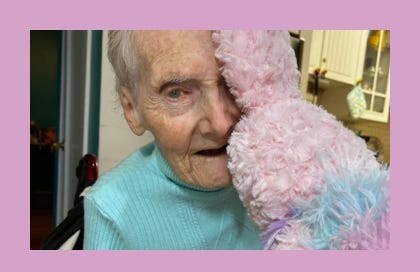



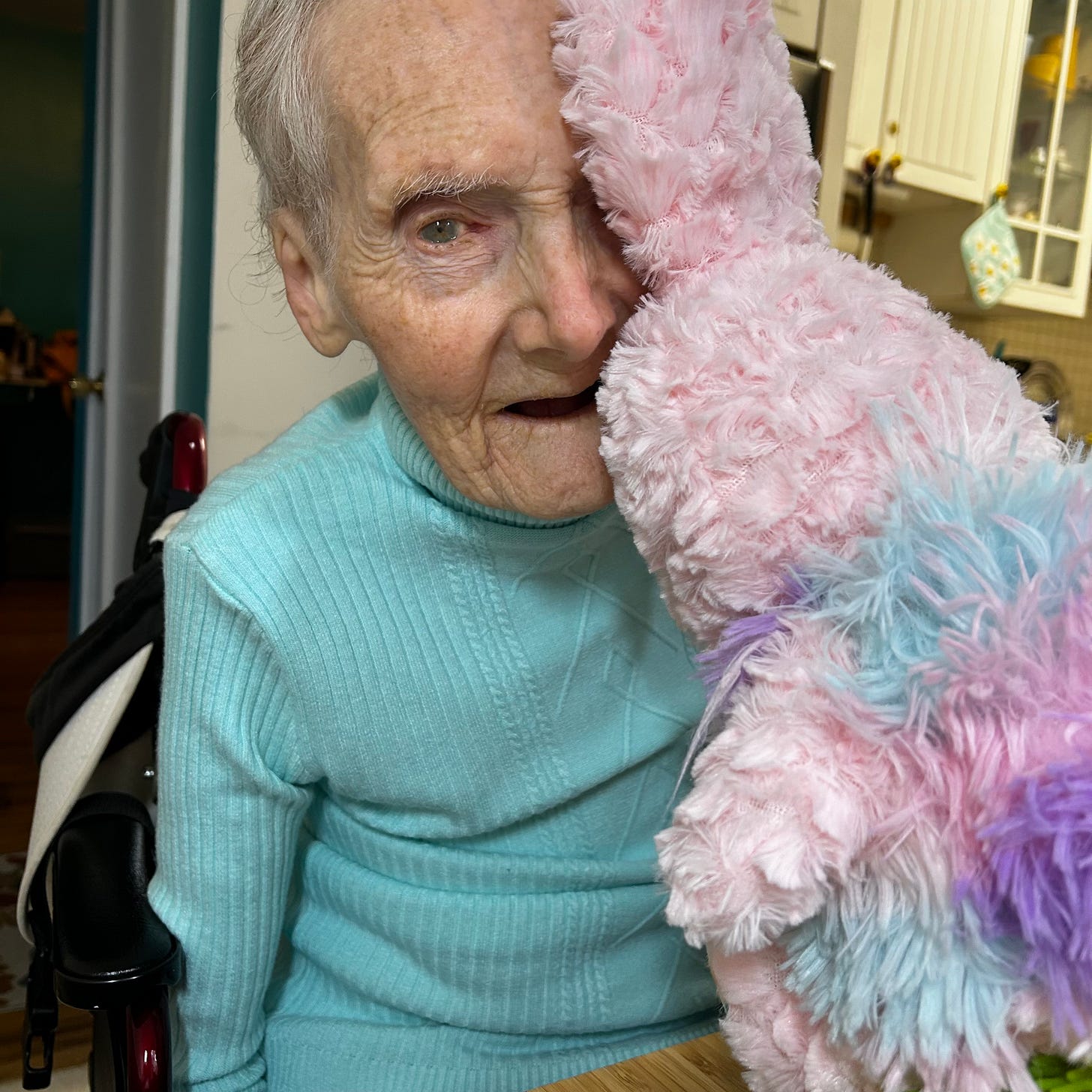
"Meet them where they are, not where you want them to be." That is such a valuable tip, Jodi, and one I realised was important when being with my "elders" with dementia.
So glad your Ma's hearing aid is helping her reconnect with the world.
Isn't that exciting! Hearing has such an impact on every aspect of your life! I've had a hearing aid in one ear for two years now. Mainly because I couldn't hear my students or engage clearly in a conversation. I also read how if you wait too long the visual neurons take over and it leads to dementia.
We have tried for years to get my mother to agree to hearing aids. I love the analogy of cotton balls in her ears. It would make sure a difference but can't be forced.
So glad that your mom is more of herself and is dancing to the beat of life!